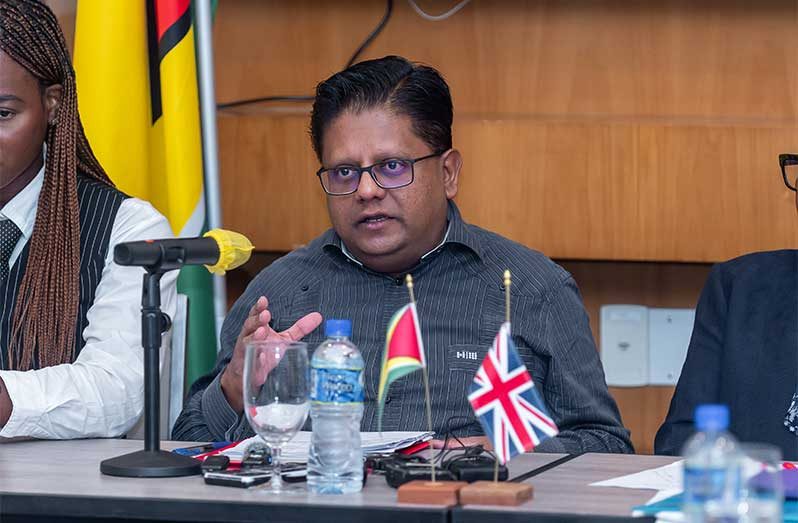–to withstand global price fluctuations, Finance Minister
SENIOR Minister in the Office of the President with responsibility for Finance, Dr Ashni Singh, has said that the government has deliberately structured the country’s macroeconomic framework to withstand fluctuations in the global commodities market, including fluctuating oil prices.
Dr Singh, in an invited comment on Tuesday, said while Guyana is experiencing rapid growth, it remains deeply integrated into the international trading system and is therefore exposed to external economic pressures.
“We operate as part of a global trading system and we continue to be a small, open economy. That’s the reality. Notwithstanding that we were growing, and we’ve been doing very well, we continue to be a small, open economy in a very large, open and dynamic, global economic and trading space,” he said.
Dr Singh reminded that Guyana’s economy is still significantly reliant on primary commodities, making it vulnerable to shifts in external market conditions.
He said: “We continue to be an economy in which primary commodities are a significant contributor to overall economic activity, and so the reality is that we are operating in an environment where there is, and will be, commodity price movements, and different commodity price volatility. You quite rightly point out that oil prices have been, in recent times, [on] a relatively downward, trajectory.”
With this, Dr Singh noted that the administration closely monitors international economic trends and incorporates this analysis into national planning.
He said: “We keep a close eye on external market developments. This is why we devote a whole chapter in the budget speech to the global environment. This is why we devote to the mid-year report, an entire chapter on global economic developments, because we pay close attention to the global context.”
Dr Singh said that the government’s economic thinking has long centred on building resilience, noting: “We have always emphasised the importance [of resilience], President Ali himself, Vice President Jagdeo himself and yours truly, we have always, everybody who speaks on the economy now, has always emphasised the importance of resilience, and resilience means numerous dimensions.”
Resilience, he added, must include the capacity to absorb and adapt to global price changes, particularly in oil.
Dr Singh said: “When we speak of a more resilient economy, we’re speaking of an economy that is resilient to ebbs and flow of global economic developments, including commodity price movements. So, all of the structures that we have built, you know, all of the entire policy framework that we have articulated, is built and designed to ensure that we are resilient to movements in oil prices.”
While acknowledging that higher oil prices would yield greater revenues, the minister emphasised that economic planning is not dependent on such favourable conditions.
He said: “Now, obviously, as an oil-producing country, we would like oil prices to remain strong or high or as high as possible, because that has an impact, of course, on the revenues that we receive, because that’s a function of production and of prices.”
Dr Singh, however, made it clear that Guyana’s macroeconomic framework is intentionally structured to withstand price drops.
He related: “I’m happy to say to you that we have been careful as a government to build structures and to build a macroeconomic framework that is still extremely resilient, and that they withstand… that has sufficient resilience to be able to withstand movement in oil prices.”
As a government, Dr Singh said that they have always been at pains to be very clear that a macroeconomic framework cannot be built on the assumption that oil prices will remain at certain prices.
He said: “We, as a government, have always said that, that you cannot build a macroeconomic framework around an assumption of oil prices being at $98 or $100 a barrel you know, forever… we’ve also been at pains to ensure that we don’t build our frameworks on the assumption of oil prices being at an elevated level forever.”
When asked about possible changes in investments for the upcoming budget, Dr Singh stated that everyone will see where the government invests more and less when the budget is presented.



.jpg)









